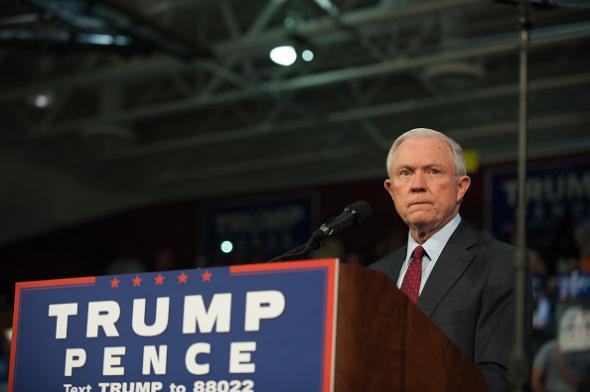
Jeff Swensen/Getty Images
Is This Normal? is a new Slate series that will attempt to determine which controversial Trump World behaviors are outrageously unprecedented, which are outrageous but within the realm of what others have gotten away with, and which shouldn’t even be considered outrageous at all.
The Issue
Senate Republicans have scheduled eight Trump administration Cabinet confirmation hearings to take place within a span of three days this week. (The Cabinet consists of the vice president, who is elected rather than confirmed, and the individuals who lead federal departments. The Senate also confirms other “Cabinet-level” figures—as in, people who attend Cabinet meetings—and agency directors.) Five of them will be ongoing on Wednesday, which is the same day Donald Trump is scheduled to hold a press conference in New York City. Democratic senators have complained that this jampacked schedule will prevent them from attending all of the hearings that they’d like to be present for and that the rush is preventing them from giving appropriate public scrutiny to nominees such as Alabama Sen. and would-be attorney general Jeff Sessions. Multiple outlets have also reported that the incoming administration has failed to complete standard background checks (which can include vetting by the FBI, IRS, and Office of Government Ethics) on nominees whose hearings are set to be held this week.
Is this normal?
The Precedent
A majority vote of the full Senate is required for actual confirmation, but confirmation hearings are held by the Senate committee relevant to the nominee’s position. Information about the timing of Obama and George W. Bush administration Cabinet and Cabinet-level confirmation hearings is available on the Senate’s website and from the Congressional Research Service (hat tip to FiveThirtyEight for pointing me to the CRS document). Going strictly by Cabinet positions proper (and not “Cabinet-level” positions or agency directors) to make sure we’re comparing apples to apples, here’s how the past two administrations’ hearing schedules stack up against the next one’s:
- Eight Trump Cabinet hearings will have begun by the end of this week, which is Jan. 13. The eighth Bush administration Cabinet hearing began on Jan. 18, 2001. The eighth Obama administration hearing began on Jan. 14, 2009.
- There will be four Trump Cabinet hearings held on Jan. 11. By comparison, five George W. Bush Cabinet hearings were held on Jan. 18, 2001; four Obama Cabinet hearings were held on Jan. 13, 2009.
While detailed data about the date that past nominees’ background checks were completed does not seem to be publicly available, the director of the Office of Government Ethics wrote Friday that the OGE “has not received even initial draft financial disclosure reports for some of the nominees scheduled for hearings,” an issue the director (a former Obama campaign donor, for what it’s worth) described as being unprecedented in the 40-some years of the OGE’s existence. A former Federal Election Commission chairman named Trevor Potter (who’s a Republican, albeit one who has previously been critical of Trump) also used the word “unprecedented” in discussing the subject with the Washington Post.
Several news reports do note that George W. Bush’s nominee to lead the Department of Education, Rod Paige, did not submit his background-check paperwork to the Senate until after his 2001 hearing. But this appears to be the only specific example of such lateness in circulation. Meanwhile, more than one report by the Congressional Research Service simply asserts as fact that an incoming administration’s Office of Counsel will have completed a potential nominee’s background check process before the president-elect submits that nominee to the Senate for consideration.
The Ruling
The Trump administration’s nominee-hearing schedule is not significantly more accelerated than those of past presidents. It is Normal. The incoming administration’s reported failure to complete background checks on its nominees before their hearings, however, does not appear to be Normal.